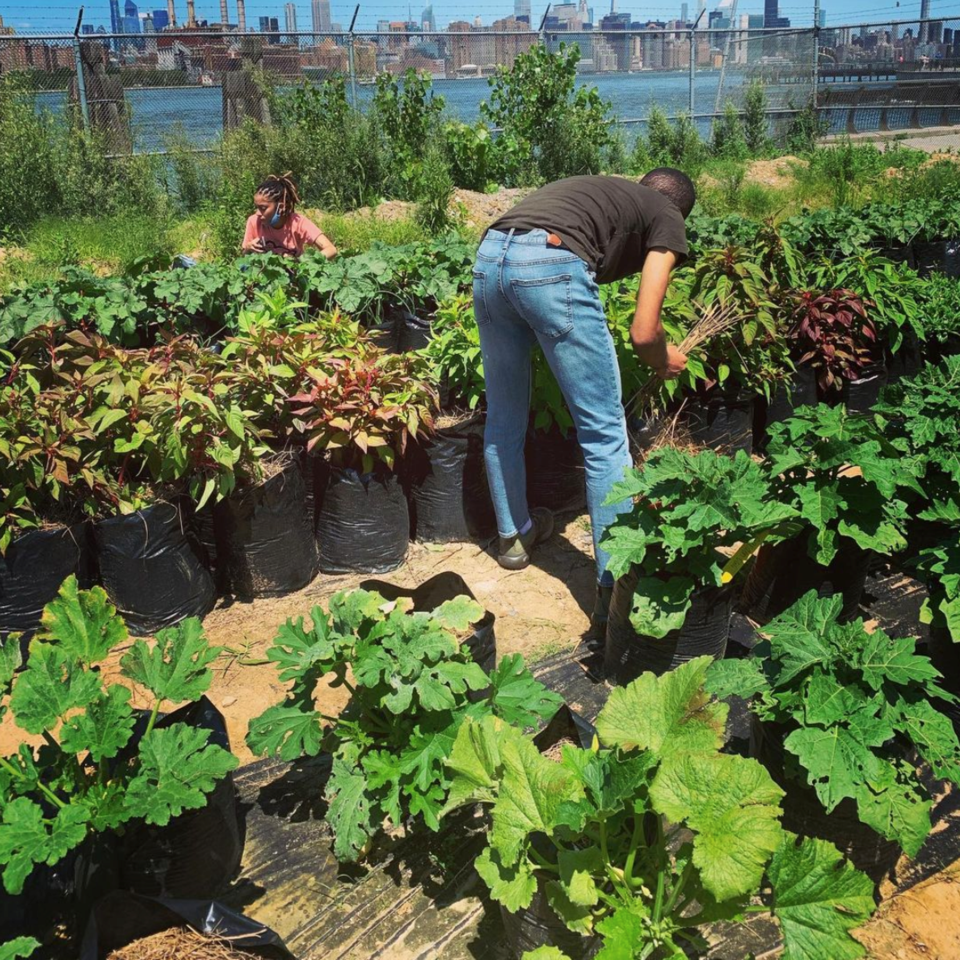At an urban farm in Bushwick, goldfish from the pet store are doing much more than looking pretty in a bowl — they're helping farmer Yemi Amu feed her neighborhood.
Amu is the founder and director of Oko Farms, farms that use the technique of aquaponics to cultivate fresh fish, vegetables and herbs.
While the goldfish are not farmed for food, they are part of the aquaponics ecosystem that recycles water from fish to plants and back again, with both getting benefits from each other.
"We have a variety of fish on the farm including goldfish, koi, channel catfish, bluegill and mirror carp," Amu explains.
"The goldfish and koi came from the pet store so that we can show people that you can use non-edible fish as well. Most importantly, visitors learn how to humanely raise fish they get from the pet store."
Since starting the farm at 104 Moore Street in 2013, Amu has proven its viability and is now expanding a new site on River Street in Williamsburg, with the help of a recent grant.
The move makes Oko Farms the largest aquaponics farm and education center in NYC — with Amu having a major focus on teaching the technique to other urban farmers.
"Our goal is to make it a year-round farming and educational center with a purpose of giving people tools to grow food for themselves and increasing environmental awareness," she told BK Reader.
A seed
Amu was first introduced to aquaponics by a garden volunteer, while working as a rooftop farmer at a housing facility in Brooklyn.
She'd studied agricultural science in middle and high school growing up in Nigeria, but hadn't heard of the technique before. She got interested.
While many may not think of goldfish, or any type of fish, when they think of growing veggies, aquaponics is has been around for more than 1,000 years.
Aquaponics uses a closed loop system from fish to plants and back again. The solid waste from the fish is filtered out of the water, and the beneficial nutrients like nitrogen are piped into the water the plants are growing in?.
The plants then filter toxins from the water so it can safely be returned to the fish. The technique conserves water as the water is constantly recycled.
An opportunity
In 2013, when the Brooklyn Economic Development Corporation invited her to view an empty lot in Bushwick for a farm, she jumped on it.
Everyone else the BEDC had approached prior had turned it down because of lack of access to water on the lot, she told Serious Eats. But it was perfect for aquaponics, as almost all the water is recycled.
The farm initially began with a focus on selling produce, Amu told Vogue, but when one of its large buyers, Roberta's, decided to switch to importing basil for its pizzas from Israel, Amu saw the opportunity to start experimenting with new possibilities in aquaponics.
The experiment led to a farm so fruitful it was able to help feed the community through the pandemic.
"As a response to the pandemic, the Moore Street site now serves primarily as a food production and distribution farm," Amu said.
"All the food produced there is distributed to the community via an organization called Comida Pal Pueblo, who support the food distribution and also manage the farm. It is an opportunity for them to learn aquaponics farming while also serving the community."
New site, new classes
That's freed up Amu to run the new farm site in Williamsburg, and expand her vision of educating the city on aquaponics.
She said Oko Farms will begin farming-based classes in September, with a 6-Week Aquaponics Intensive Program. Participants will learn the science, history and practice of aquaponics farming while engaging in hands-on farm work.
"Growing food has helped me develop a relationship with nature that is unique for someone living in an urban environment," Amu told BK Reader. She is now focusing more on growing plants and foods she grew up with in Nigeria, even taking seeds from her mother's garden.
"I understand the rhythms of nature in an intimate way that has changed how I see myself and the world around me.
"My job is to grow food, but my purpose is to develop a reciprocal relationship with nature and to pass that on to others."
A helping hand
Oko Farms is also the recent recipient of a $10,000 grant from Fiskars, which has partnered with sustainability advocate and social media influencer Farmer Nick Cutsumpas to give four community gardens a cash boost.
The grant will go towards developing Oko Farms' new site in Williamsburg.
"Working with Oko Farms and learning about aquaponics as a sustainable farming method has been such a wonderful experience," Farmer Nick said.
"Yemi and her team are truly doing it all at their new farm, and aside from growing in water, they also grow in recycled grow bags and raised beds with soil."
To learn more about Oko Farms and its upcoming aquaponics courses, click here.




